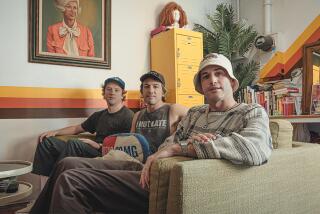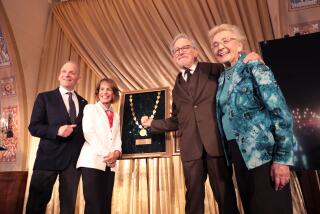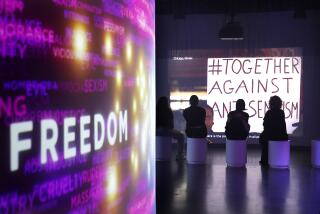WWII Odyssey Leads to Chair in Holocaust Studies
- Share via
A citizen of Israel who once aspired to be a Roman Catholic priest arrives in Los Angeles today to become the first holder of a UCLA chair in Holocaust studies.
And as his background indicates, Prof. Saul Friedlander’s journey to the Westwood campus has been much more circuitous than his flight here from Israel, where he now lives as a committed Jew.
Friedlander’s odyssey began in 1942 when a family friend deposited the Czechoslovakian-born 10-year-old in a French Roman Catholic school where the nuns agreed to hide him from the occupying Nazis. Cut off from his parents, who were attempting to flee France, the boy gladly adopted the religion of his saviors and decided to become a priest.
His course changed abruptly three years later, at the end of World War II, when the young teen-ager learned that his Jewish parents had been murdered at Auschwitz. Shocked by this information, he developed an interest in Zionism and Judaism and sailed for Israel in 1948.
Along the way, Friedlander changed his name three times, each new identity symbolic of a larger change in life.
He was born Pavel Friedlander in Czechoslovakia in 1932, but assumed the more French-sounding Paul when the family fled to France in 1939 as the armies of Hitler’s Third Reich invaded Czechoslovakia. He became Paul-Henri to further disguise his identity when he entered the Catholic school, and later adopted Shaul, Hebrew for Saul, when he migrated to Israel.
After all these changes, his Catholicism has disappeared, Friedlander said by phone last week from Jerusalem, where he and his wife, Hagid, have raised three children.
“The Catholicism was not something I chose,” said Friedlander, now 55. “Don’t forget I was 10 years old when I was hidden in that Catholic school. At the age of 10 under such circumstances one doesn’t choose. One accepts what the surroundings impose on you.” In order to take the new UCLA post, Friedlander has resigned a teaching position at the University of Geneva, but will retain his chair in Modern European History at the University of Tel Aviv, where he teaches every fall. The UCLA chair will allow him to focus on his speciality, Nazi policies toward the Jews, said Friedlander, who is a specialist in modern European history and has published nine books dealing mostly with Jewish history.
“This appointment allows me, for part of a year, to connect my research and writing with my teaching,” Friedlander said. “I find it very congenial to be able to do that now that I am not a youngster of 30.”
By retaining his appointment at Tel Aviv University, 40 miles from Jerusalem, he maintains what he called “my very strong and basic connection to Israel.”
Although Friedlander calls himself “a secular Jew” who doesn’t go to synagogue often, he feels, he said, “totally part of the Jewish people” and “strongly attached to the spiritual heritage.”
“And I’m very attached to Israel,” he said. “I teach in Hebrew. I live here. My children are born here. It’s a total belonging, as an American would feel part of the American heritage, which doesn’t need a special explanation or justification.”
Search for a Home
The Friedlanders will stay in a Westwood apartment while looking for a permanent home in Los Angeles, a proposition which Friedlander called “the most mysterious part of the whole trip.” But, he added, “many other people have moved to UCLA and I’m sure there is some way of solving these (housing) problems.”
Their three children will remain in their current locations: Eli, 27, studying for a Ph.D. in philosophy at Harvard; David, 23, pursuing a degree in Far Eastern languages in Paris; and Michal finishing high school in Israel.
His arrival culminates a 7-year search on the part of the university. The Holocaust studies chair was authorized in 1980 after the 1939 Club, a group of about 700 Los Angeles Holocaust survivors, raised $250,000 for an endowment. Five visiting professors, including Friedlander in 1983, have temporarily occupied the chair since that time, but Friedlander is the first permanent appointment.
For all his current comfort with his Israeli identity, however, Friedlander’s childhood adoption of Catholicism was complete.
Friedlander explained that he knew very little about Judaism because the elder Friedlanders were not practicing Jews and had attempted to assimilate into the Czechoslovakian culture. When his parents attempted to flee Nazi-occupied France, they entrusted their only child to the wife of a French aristocrat who had befriended them. With his parents’ prior consent, she turned Friedlander over to a Catholic school.
A short time after he began his studies, Swiss border guards refused to let his parents enter Switzerland. Unbeknownst to the boy, they were arrested and sent to Auschwitz.
Without parents or letters or visitors at school, Friedlander threw himself into Catholicism, he recalled in his 1978 autobiography, “When Memory Comes.”
“Religion dominated our lives,” he wrote. “Mass, the adoration of the Holy Sacrament, and meditations marked the essential moments of our days. . . .
“The visit to various churches on Holy Thursday elated us, and the Good Friday services overwhelmed us: we were literally following in the footsteps of the Savior, imagining His sufferings, weeping at His death, exulting at the news of His Resurrection.
Accepting Catholicism
“I had passed over to Catholicism, body and soul. The fact that the misdeeds of the Jews were mentioned during Holy Week did not trouble me in the slightest.”
Soon after he entered the school in the fifth grade, the boy decided on his new vocation: “I wanted to become a priest.”
It was three years later, during a talk with a Jesuit priest who had befriended him, that the teenager’s ambition began unraveling.
“Didn’t your parents die at Auschwitz?” the priest asked.
Friedlander did not even understand the question because the nuns who ran his school had shielded him from the details of his mother and father’s disappearance.
“What did this name mean? Where was Auschwitz?” Friedlander wrote. “He (the priest) must have understood then that I knew almost nothing of the extermination of the Jews.”
Over the next couple of days, Friedlander remembers, he and the priest “talked at great length about what had happened” in the concentration camps. “For the first time, I felt myself to be Jewish--no longer despite myself or secretly, but through a sensation of absolute loyalty,” Friedlander wrote.
As a result of this unsettling experience, Friedlander began to read about Judaism and to ask questions. A short time later he went to a Zionist youth camp where he accepted the argument that a Jewish state was necessary to allow Jews to take their fate into their hands.
In 1948, he said, at age 15, he dropped out of a public school, lied about his age and boarded a ship of 900 men who sailed to Israel to fight for the creation of a Jewish state. His motives for making the journey, he said, were to join “my personal fate to a common lot . . . dissolving my personal anxieties in the enthusiasm of a group.” When he arrived, however, authorities discovered his age and an uncle was phoned to pick him up.
He has remained in Israel since that date, taking time out to earn a Ph.D. at the University of Geneva in 1963 and for numerous lectures and teaching assignments abroad.
Leading Educator
He won his nation’s top award for an educator--the Israel Prize--in 1983 and has been a leading participant at international meetings on the Holocaust. While he is here, Friedlander will teach an undergraduate course on “The Third Reich and the Jews” as well as a graduate research seminar.
According to Herbert Morris, dean of humanities at UCLA, the interest on the Holocaust chair endowment may be used to pay for research, books, scholarly trips, assistants or other expenses, but Friedlander’s basic salary of $56,800 for two quarters will be paid by the state.
That salary level, Morris said, is reserved for scholars and professors of the highest distinction.
The dean said Friedlander, who was selected after an exhaustive search, fits that category because he would bring unusual breadth to his assignment. Specifically, Morris referred to Friedlander’s expertise in researching archival materials and in the new specialty of constructing psychological profiles of historical figures, as well as sophistication in philosophy and the criticism of literature and art.
He has made extensive use of archival materials in several of his books, Friedlander said, including “Pius XII and the Third Reich,” in which he argues that during World War II the Pontiff did not speak out to save the Jews, and that his silence was tragic because his voice could possibly have made a difference in their survival. Another study, “History and Psychoanalysis,” explores the possibilities and limits of psycho-history.
Friedlander hopes to bring into the classroom his insights on the destruction of the Jews, which he thinks has an important lesson to teach.
“It’s an essential chapter in modern history,” he said. “A crucial chapter. There is hardly a period which can go beyond those events in their significance about what I would call the ultimate destructive potentiality of human beings in certain circumstances.”
More to Read
Sign up for Essential California
The most important California stories and recommendations in your inbox every morning.
You may occasionally receive promotional content from the Los Angeles Times.










